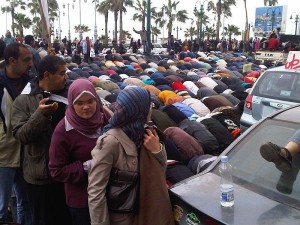Ahead of tonight’s first 2012 presidential debate, new questions are being raised about the Obama Administration’s policies on counterterrorism abroad — one of the Administration’s main foreign policy record talking points — in light of the attack on the US consulate in Benghazi Libya that killed four Americans.
Darrell Issa (R-CA) [...]]]>
 Ahead of tonight’s first 2012 presidential debate, new questions are being raised about the Obama Administration’s policies on counterterrorism abroad — one of the Administration’s main foreign policy record talking points — in light of the attack on the US consulate in Benghazi Libya that killed four Americans.
Ahead of tonight’s first 2012 presidential debate, new questions are being raised about the Obama Administration’s policies on counterterrorism abroad — one of the Administration’s main foreign policy record talking points — in light of the attack on the US consulate in Benghazi Libya that killed four Americans.
Darrell Issa (R-CA) has called for Secretary of State Clinton to testify at a House Committee on Oversight and Government Reform on how the State Department weighed two bomb attacks on the consulate in the preceding months in light of increased security concerns over US assets in Libya. Republicans are also questioning whether the Administration maintained for several days that the attacks were the result of anti-American riots over a film in order to deflect blame for not seeing a pre-planned attack coming. But according to The Daily Beast/Newsweek, the CIA informed top officials in a briefing three days after the attacks that killed Ambassador Chris Stevens — when UN Ambassador Susan Rice was asserting that the attacks were the result of the riots — that “the events were spontaneous.”
That briefing, the report notes, has since been called into question. The Associated Press reports that “[w]ithin hours of last month’s attacks on U.S. diplomatic facilities in Benghazi, Libya, President Barack Obama’s administration received about a dozen intelligence reports suggesting militants connected to al Qaeda were involved,” yet the official messaging remained contradictory. According to the LA Times, the US reportedly began tracking suspected militants in Libya by drone and wire-intercepts in the aftermath of the attack, suggesting that there were concerns in advance over their intentions towards the consulate.
The Associated Press also reports that questions over the attacks — which became a flashpoint in this presidential campaign raised by Republicans are likely to become a venue for criticizing the Administration’s Mideast policies. Politico reports that within the Romney campaign, there is division among his advisors over whether or not to shift some focus from the economy over onto the Benghazi attacks, with campaign manager Stuart Stevens against making such a shift, likely due to the strong backlash against Romney’s earlier comments that were made without knowledge of the four Americans killed in Libya.
But given the internal rifts within the campaign over Stevens’s leadership style, it’s not certain that foreign policy pundits have lost the battle, as they continue to assail Obama on Libya alongside Congressional Republicans demanding an investigation into what intelligence warnings the State Department may have had ahead of September 11, 2012 but failed to act on. The Christian Science Monitor
suggested that Republicans will be “Jimmy Carterizing Obama” in spite of such internal debate, as those close to the campaign — such as former UN Ambassador and Romney advisor John Bolton — have pulled no punches in their TV appearances.
Of all the prominent Republican critics, only Senator John McCain (R-AZ) — while still demanding the Administration clarify its contradictory remarks about the attacks — has offered a qualified defense of the US’s overall record of intervention Libya, criticizing his interviewers on Fox News last month for suggesting that Libyans generally supported the attackers. In fact, tens of thousands of Benghazi residents demonstrated against Islamist militias soon after the attacks and the government launched a crackdown on suspects and loose weapons in the city.
McCain has also charged the Administration is retreating from the region, but the US intelligence and military presence is set to increase in Libya in the coming weeks now that the intelligence community has fingered several pre-existing Islamist organizations in “chatter” over the attacks.
The personal and controversial nature of much of the criticism over what has been one of the Administration’s most concrete achievements in the Middle East since 2008 seems to be wearing patience thin in the White House.
The Administration’s growing anger over the criticism being aired against it was best exemplified in an expletive-filled exchange between one of Secretary of State Clinton’s top aides and journalist Max Hastings this week. Hastings defended CNN’s controversial use of the late ambassador’s recovered diary in its Libyan reporting last month. The Administration is upset with CNN’s handling of the diary partly because the network tried to keep its use of his diary quiet. But the diary is also embarrassing from a policy standpoint because in it, CNN says the late ambassador was concerned the consulate was being targeted by terrorists.
Unnamed officials now concede that the US had (general) concerns about targeting in the months prior to the attack, such that special forces teams were dispatched to Libya and other Muslim countries to set up rapid-response counterterrorism centers. According to the AP report that quoted these officials, the center in Libya was too new to have offered sufficient advance warning.
There may be further Beltway discussion of Obama’s Middle East record based on a report in the Wall Street Journal detailing how Egypt’s new Muslim Brotherhood President has been cutting deals with Islamist groups to release batches of their members imprisoned by Hosni Mubarak. The majority of these men — who were tortured by Mubarak’s security services for years — are thought to be political prisoners now too old and bruised to pose any security threats. But several of those freed, the Journal reports, are still active as militant organizers. One of those released was Muhammad Jamal Abu Ahmad, an Egyptian national who is believed to be the main point-man for an al Qaeda core leadership seeking to (re)assert it’s presence in the Maghreb.
Ahmad is reportedly seeking to step up operations in Libya under his own aegis against Libyan and American targets.
]]>In a recent Fox News article, the American Enterprise Institute’s Michael Rubin presents an issue that will consume Middle East policy makers for decades: “Is There Really Democracy in the Middle East?” He’s apparently not interested, however, in serious analysis of that question. Instead Rubin offers a partisan polemic [...]]]>
 In a recent Fox News article, the American Enterprise Institute’s Michael Rubin presents an issue that will consume Middle East policy makers for decades: “Is There Really Democracy in the Middle East?” He’s apparently not interested, however, in serious analysis of that question. Instead Rubin offers a partisan polemic criticizing the Obama administration’s responses to the Arab Spring and last week’s events in Benghazi.
In a recent Fox News article, the American Enterprise Institute’s Michael Rubin presents an issue that will consume Middle East policy makers for decades: “Is There Really Democracy in the Middle East?” He’s apparently not interested, however, in serious analysis of that question. Instead Rubin offers a partisan polemic criticizing the Obama administration’s responses to the Arab Spring and last week’s events in Benghazi.
Rubin dismisses as “initial optimism” Secretary of State Clinton’s September 2011 description of a “US strategy… based on America’s experience at the end of the Cold War, helping countries that are moving to democracy.” For Rubin, the Arab Spring is far different. Last week’s violence in Benghazi was “equivalent to…Robespierre unleashing the Reign of Terror in the chaos…following the 1789 storming of the Bastille that began the French Revolution.” He argues that President Obama was annoyed “with analysts who suggested that Islamists might hijack the uprisings” and “directed his aides to discount parallels to Iran and focus instead on comparisons to Eastern European transitions after 1989” instead. He goes on to add, in a dramatic tone channeling the stentorian tones of Orson Welles, that “the Islamist putsch continues…as the Muslim Brotherhood…filled the vacuum” in Tunisia and Egypt after their respective dictators abdicated.
Unfortunately, Rubin can only offer a hardly realistic alternative. He suggests that we “ask whether democracy is even possible in the region” because Islamists will inevitably hijack it, as he states they already have in Egypt, Tunisia and Libya. And since he refers to the French Revolution more than once (but in misleading comparisons), it is appropriate to characterize Rubin’s policy preference in those terms. He seems to deny the Arabs who removed their autocratic regimes the legacy of the French Revolution that we in the West have enjoyed for two centuries. Historians define almost unanimously this legacy as including the basic rights of man and citizen, the right to free and fair elections, an end to feudalism and hereditary privileges, the equality of all men under the law, and free speech and thought.
Despite Rubin’s version of the Obama administration’s missteps, can anyone identify any Middle East policy makers in or out of government, in the US or abroad, who do not agree with Rubin’s Kuwaiti academic, Saad al-Din Ibrahim, when he says that “It’s understandable the Muslim Brotherhood won… after years in opposition they could promise constituents the world?”
Inconveniently for Rubin, we in the West bear some responsibility for the unique domestic popularity of Islamist parties within Middle Eastern nations. Rubin understands the strength of Islamists in Arab societies today but chooses pointedly to ignore the reasons for their presence. During the Cold War, the region’s autocrats attracted Western aid by suppressing the left. Autocrats promoted Islam as a domestic bulwark against leftist movements. Israel even adopted this tactic. As is commonly reported, Israel provided Hamas support to grow into an alternative to leftist Palestinian organizations. After the fall of communism, Arab autocrats maintained American support by ensuring that their domestic opposition could not interfere in negotiating peace agreements with Israel.
Rubin also complains that the Administration is “treating American aid as an entitlement for hostile regimes.” The last time I checked, Egypt, Tunisia, and Libya are not enemies of the United States. No doubt, elements within their societies are, but elements like these also exist in Eastern Europe and among other US allies. Rubin’s complaints about American financial aid “appeasing” the newly elected regimes discounts the possibility that they may truly enjoy majority support from their electorates. Moreover, the US has provided aid to foreign nations to enhance American interests for decades; it’s not charity.
Since Rubin expects any administration to ensure a continuance of American influence in the region, the Obama administration’s early support for the Arab Spring, its assistance to the Libyan Revolution and financial aid, are among the tools the US must continue to employ; “big sticks” are no longer an appropriate option. Rubin also ignores elements within these countries that can serve as US allies such as the Egyptian army and the thousands of Benghazi residents who ejected Islamist militias from the city the other day. His account of the Benghazi violence never mentions that dozens of Libyans tried to help the beleaguered diplomats.
Rubin’s main problem seems to be with Middle Eastern democracy itself. He seems truly unsettled by the results of free elections. But democracy can be messy; its initial baby steps messier still. Sometimes your friends don’t win. There is no evidence that Islamists stole the Egyptian elections. President Mohamed Morsi may have won the freest and fairest election in the country’s history. It would be much worse for the US, presuming a monopoly on democratic perfection, if it were to deny it to others. The US is fortunate as of yet to remain relatively untarnished by the West’s history of predatory and lethal activities throughout Asia, Africa, and the Middle East. Perhaps, unlike in Iran, the US can reap the wind without sowing the whirlwind.
]]>